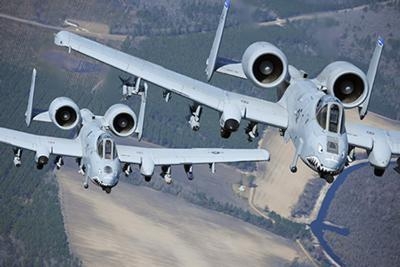Mon, Nov 10, 2014
Persistent Close Air Support Designed To Speed Close Air Support To Ground Troops
Raytheon has begun flight testing DARPA's Persistent Close Air Support (PCAS) program. PCAS Phase 3 is an 18-month, $25.5 million effort scheduled to culminate in live-fire demonstrations. The program is designed to speed close air support to soldiers on the battlefield.

"PCAS will help reduce close air support response times from as long as one hour to just six minutes," said Tom Bussing, Raytheon vice president of Advanced Missile Systems. "By delivering critical information to decision makers more quickly, PCAS will save lives in the battlespace."
PCAS will enable ground troops, Joint Terminal Attack Controllers (JTACs) and combat aircrews to share real-time situational awareness and weapons systems data. With PCAS, soldiers on the battlefield can quickly and positively identify multiple targets simultaneously. JTACs and aircrews will jointly select the best precision-guided weapons for each target while minimizing collateral damage and friendly fire.
Current flight testing will highlight PCAS-air performance on an A-10 Thunderbolt aircraft and connectivity with the JTAC equipped with a PCAS-ground kit. The key element of PCAS-air is modular smart launcher electronics, which can be easily ported from one platform to another.
Once flight testing is complete, the PCAS system will be available for integration with other aircraft and participation in other demonstrations. Digital interoperability between platforms and JTACs will allow for increased situational awareness, improved coordination, and decreased timelines for close air support.
Raytheon is the systems integrator for PCAS and leads an industry team comprised of Rockwell Collins, General Electric, BAE Systems and 5-D Systems. Raytheon brings its expertise in overall systems integration, weapons, aircraft integration and unmanned aircraft system ground control stations to PCAS.
(A-10 Thunderbolt image from file)
More News
Aero Linx: JAARS Nearly 1.5 billion people, using more than 5,500 languages, do not have a full Bible in their first language. Many of these people live in the most remote parts of>[...]
'Airplane Bounced Twice On The Grass Runway, Resulting In The Nose Wheel Separating From The Airplane...' Analysis: The pilot reported, “upon touchdown, the plane jumped back>[...]
"Burt is best known to the public for his historic designs of SpaceShipOne, Voyager, and GlobalFlyer, but for EAA members and aviation aficionados, his unique concepts began more t>[...]
"Polaris Dawn, the first of the program’s three human spaceflight missions, is targeted to launch to orbit no earlier than summer 2024. During the five-day mission, the crew >[...]
There Are SO Many Ways To Get YOUR Aero-News! It’s been a while since we have reminded everyone about all the ways we offer your daily dose of aviation news on-the-go...so he>[...]
 ANN's Daily Aero-Linx (05.04.24)
ANN's Daily Aero-Linx (05.04.24) NTSB Final Report: Quest Aircraft Co Inc Kodiak 100
NTSB Final Report: Quest Aircraft Co Inc Kodiak 100 Aero-News: Quote of the Day (05.04.24)
Aero-News: Quote of the Day (05.04.24) Aero-News: Quote of the Day (05.05.24)
Aero-News: Quote of the Day (05.05.24) Read/Watch/Listen... ANN Does It All
Read/Watch/Listen... ANN Does It All



